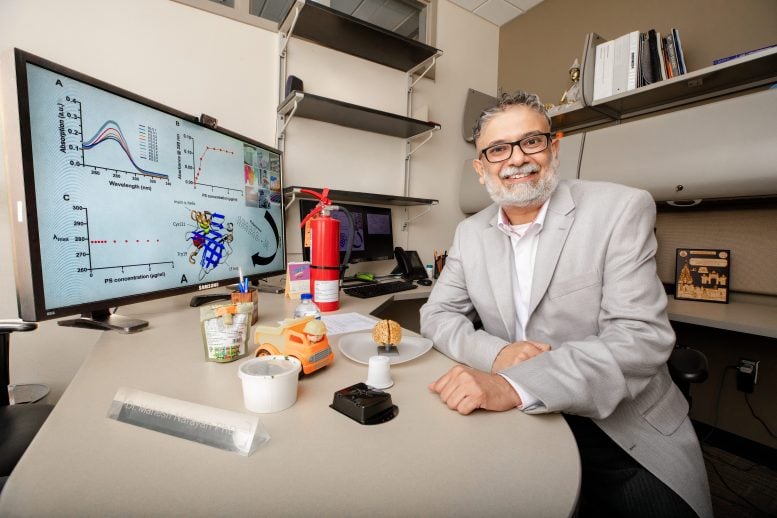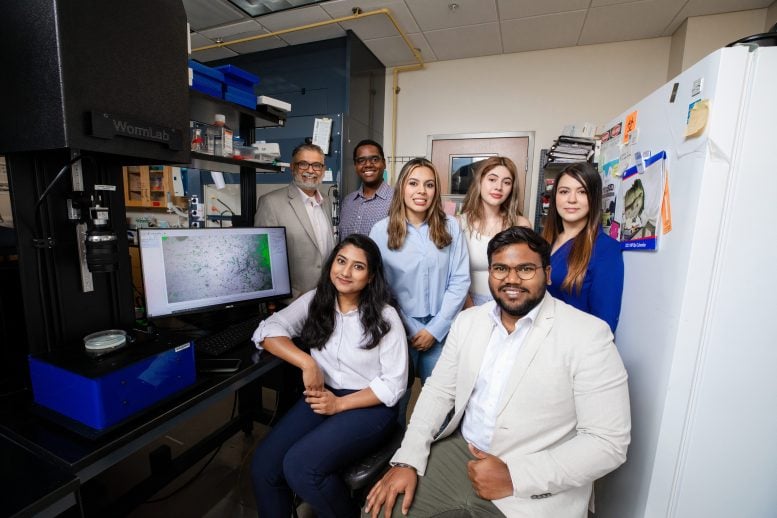UTEP researchers found that nanoplastics and PFAS chemicals significantly alter proteins essential to human development, such as breast milk and myoglobin, potentially causing developmental disorders and other health problems. These findings highlight the urgent need for safer alternatives and will inform future environmental policy.
The UTEP study revealed that both nanoplastics and permanent chemicals alter important proteins in breast milk and infant formula.
Researchers at the University of Texas at El Paso have made important advances in the study of nanoplastics and per- and polyfluoroalkyl compounds (PFAS), also known as forever chemicals. Their work shows how these compounds can change the structure and function of biological molecules. Specifically, the team found that these substances alter proteins found in breast milk and infant formula, potentially causing developmental disorders down the road.
Nanoplastics and permanent chemicals are man-made compounds present in the environment. A series of recent studies have shown that they are linked to a variety of health hazards. Nanoplastics mainly result from the degradation of larger plastic materials, such as water bottles and food packaging, while permanent chemicals can be found in a variety of products, including cookware and clothing.
The UTEP research team focused on the compounds’ effects on three proteins important to human development and function: beta-lactoglobulin, alpha-lactalbumin and myoglobin. The findings, which provide atomic-level insight into the harmful effects of nanoplastics and PFAS on human health, are described in two recent papers. Journal of the American Chemical Society and ACS Applied Materials and Interfaces.

Dr. Mahesh Narayan, professor and chair of the Department of Biochemistry, School of Chemistry and Biochemistry, Texas Tech University. Photo courtesy of University of Texas at El Paso
“Understanding the molecular mechanisms by which nanoplastics and permanent chemicals disrupt cell function can enable scientists to develop safer alternatives to these materials,” said Mahesh Narayan, PhD, professor and chair of the Department of Biochemistry in UTEP’s Department of Chemistry and Biochemistry and Fellow of the Royal Society of Chemistry, who oversaw both studies. “The insights gained from this research have far-reaching implications.”
Most importantly, Narayan said, the study found that nanoplastics and PFAS completely “dissolve” regions of proteins called alpha helices, converting them into structures called beta sheets.
“We didn’t expect that all of these would have the same effect on the alpha helix,” Narayan says. “It was pure coincidence.” The team also observed that this change occurs in amyloid proteins, which can cause neurodegeneration and neurotoxicity if the synthetic chemicals reach the brain.
Other key findings of the study are listed below:
Milk Protein: Beta-Lactoglobulin (BLG)
BLG is a protein found in sheep and cow milk and is a popular ingredient in infant formulas. This protein binds retinol (vitamin A) and fatty acids, which are essential for an infant’s vision and brain development.
The team found that exposure to nanoplastics and PFASs reduces the efficiency of BLG binding to retinol and fatty acids, a reduction that they said could lead to serious developmental problems in newborns, as modeled by Lela Vuković, PhD, an associate professor in the Department of Chemistry and Biochemistry.
Additionally, for the first time, the team observed that PFAS bind to milk proteins, which act as carriers for these compounds.

The research team includes (top row, from left) Dr. Mahesh Narayan, professor and chair of the Department of Chemistry and Biochemistry at UTEP, Randhal Ramirez-Orozco, PhD student in Computational Science, Sofia Borrego, sophomore Biomedical Science major, Samantha Arce, sophomore Biomedical Science major, Daisy Wilson, PhD student in Environmental Science and Engineering, and (bottom row, from right) Ummi Habiba Sweety, PhD student in Environmental Science and Engineering, and Jyotish Kumar, PhD student in Chemistry and Biochemistry. Dr. Lela Vukovich (not pictured), associate professor in the Department of Chemistry and Biochemistry, also participated in the research. Credit: University of Texas at El Paso
Breast milk: α-lactalbumin
Alpha-lactalbumin is found in breast milk and is involved in the synthesis of lactose, which infants ingest for nutrition. UTEP researchers found that nanoplastics and PFAS can disrupt the structure of the alpha-lactalbumin protein, inhibiting lactose production. This disruption could lead to later developmental disorders, such as weakened immunity and reduced mineral absorption in newborns, according to the research team.
Oxygen storage: Myoglobin
Myoglobin is found in the blood and muscle tissue of most mammals and is crucial for storing oxygen. The UTEP research team found that nanoplastics and PFAS impair the function of the myoglobin protein, inhibiting its ability to store oxygen. This inhibition can lead to health problems such as shortness of breath and anemia.
Further experiments by the research team demonstrated that exposure to nanoplastics reduced the worms’ ability to move, with effects comparable to those of the herbicide paraquat, which is believed to cause Parkinson’s disease.
“This study has the potential to have a profound impact on public health and environmental policy, highlighting the critical role that scientific research plays in addressing global challenges,” said Dr. Robert Kirken, dean of the College of Science. “We are proud of the groundbreaking research conducted by Dr. Narayan, Dr. Vukovich and their team. Their innovative approach to understanding how these man-made materials disrupt the function of biological molecules is a great example of the transformative research that UTEP researchers conduct every day.”
Narayan and his team plan to continue their research and investigate the effects of other plastics and PFAS compounds.
Reference: “Atomic and molecular insights into how PFOA reduces alpha-helicity, impairs substrate binding, and shapes binding pockets in globular protein models” by Anju Yadav, Lela Vuković, and Mahesh Narayan, April 24, 2024, Journal of the American Chemical Society.
DOI: 10.1021/jacs.4c02934
“Interfacial Interactions of Nanoplastics with Biological Systems: Towards an Atomic and Molecular Understanding of Plastic-Induced Disruption of Biological Homeostasis” Afroz Karim, Anju Yadav, Ummi Habiba Sweety, Jyotish Kumar, Sofia A. Delgado, Jose A. Hernandez, Jason C. White, Lela Vukovic, Mahesh Narayan, May 9, 2024 ACS Applied Materials & Interfaces.
DOI: 10.1021/acsami.4c03008


